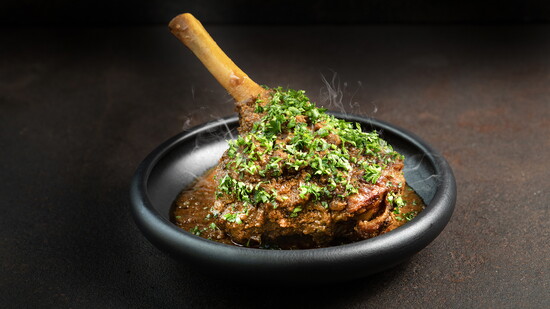When Ajit and Sukhu Kalra opened their first, full-service Indian restaurant in Highland Park in June 2024, they made history. The once-dry town had never seen a fine-dining concept rooted in Indian cuisine.
“Indian food is the fastest-growing cuisine in the U.S. right now,” Ajit says. “But we don’t see other Indian restaurants as competition—the more people get familiar with Indian flavors, the better for everyone.”
Opening Indus Progressive Indian in Highland Park was about more than food. The Kalras, longtime residents, wanted to support the community after the tragic mass shooting during the town’s Fourth of July parade in 2022.
“We’ve lived here for 15 years and are raising our children here,” Ajit says. “We realized that if we were going to make an impact, then we should invest our time, energy and finances right here—at ground zero on Central Avenue. I remember our soft opening week, neighbors came in with tears, saying it was the first time they had been back to that location.”
Both Ajit and Sukhu come from culinary roots. Sukhu grew up in a planned city north of New Delhi, known for its green spaces and views of the Himalayan foothills. Ajit’s late father, Jiggs Kalra, was a renowned food writer and New York Times bestselling cookbook author celebrated for capturing the essence of North Indian cuisine.
“We were actually working on a cookbook together before he passed away in 2019,” Ajit says. “Opening Indus became a way to carry on his legacy, but in my own voice.”
The couple’s first venture began in 2012 with a Chicago food truck.
“Sukhu was running the truck day-to-day, but at that time the city didn’t allow on-truck cooking and the parking restrictions were tough,” Ajit recalls. “We enjoyed a good year of success, but with all the regulations and then expecting our first child, we decided to step away.”
They re-entered the business in 2019 with Bhoomi, a quick-service concept featuring organic, pasture-raised ingredients. Permitting delays and the pandemic forced a pivot into Urbanspace Food Hall. “That allowed us to focus on what we loved most—creating the food—without all the overhead,” Ajit says.
The concept was an instant hit, and its success allowed them to self-fund Indus. “We used our savings and borrowed from local banks, but we didn’t want to dilute ownership. It gave us the freedom to create without compromise,” Ajit says.
Indus’ buzz continues today, with regulars returning for the samosas and chicken tikka masala that made Bhoomi so popular.
“The tikka masala is the dish most people in the U.S. know, but ours is different,” Sukhu says. “We use San Marzano tomatoes for their richness and sweetness, and we roast all our spices in-house. The flavors are just unique and beautiful.”
The masala brisket has also become a favorite. “We slow-smoke it for 14 hours with an Indian rub,” Sukhu adds. “It’s served with a house-made barbecue chutney—a Texas-style sauce layered with Indian spices. Last year for the High Holidays we had so many requests for it that people served it instead of their traditional brisket recipes.”
Other highlights include the layered biryani sealed with naan dough as well as vegan samosas with three house-made chutneys: cilantro-mint, tangy tamarind and a spicy tomato variation. Desserts, like a chocolate ganache with cardamom and fennel, are made in-house by Executive Chef Vetri Selvaraj.
Partnerships with local businesses have been part of the journey. “We’ve collaborated with Lynfred Winery, hosting dinners together and sending guests there for a glass of wine while they wait for a table—and also to DeNucci’s,” Sukhu says. “What’s happening in Highland Park right now feels like the start of a dining revival. We’re lucky to be part of it.”
